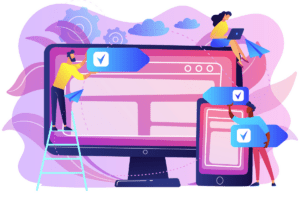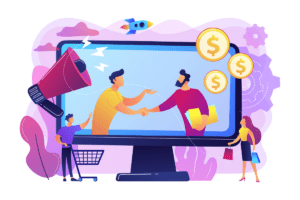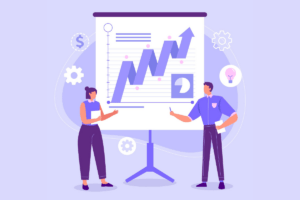Compliance in lead generation continues to be a hot topic for marketers. We constantly hear about the ethics behind lead generation, and how companies need to operate within the law. With data protection regulations like GDPR and CCPA, it’s crucial for businesses to understand laws and regulations surrounding compliance in lead generation. Keep reading to learn why companies need to prioritize compliance, the most common privacy laws, and compliant ways to generate leads. First, let’s jump into why it’s necessary to follow legal compliances.
Why Legal Compliance is Necessary for Businesses
With so much technology at our fingertips, it’s easier than ever to target very specific audiences with advertising and marketing strategies. However, with great power comes great responsibility. Companies that leverage technology to generate leads, along with other forms of marketing, need to prioritize compliance for several reasons. Here are a few of the top reasons to consider compliance in lead generation.
Trust and Reputation
Following compliances will help build trust with your audience. Consumers are increasingly aware of their digital rights and are looking for transparency from companies. And, they want to know how companies plan on using their information. Demonstrating compliance by following data protection laws can enhance your reputation and build trust with your audience.
Legal Consequences
If you happen to be non-compliant, your company may face legal consequences. This could include hefty fines. Infringements on data protection laws can lead to financial penalties that may cripple your company. Because of this, it’s in your best interest to get ahead of compliances. Consult a lawyer if you’re unsure if your website and marketing efforts follow compliance regulations.
Customer Loyalty
If it came out that your organization was improperly handling personal information, there’s a good chance that you will lose customers – current and future. By respecting privacy and complying with data protection regulations, you are more likely to have a positive customer experience. When customers feel that their data is handled responsibly, they are more likely to remain loyal.

Common Compliances to Consider
Every country has laws and regulations to follow. In some cases, it gets even more specific to state-by-state regulations. While the following are a few of the most common legal compliances, ensure you are well-versed in your areas.
General Data Protection Regulation (GDPR)
Enforced by the European Union, GDPR is one of the most influential data protection laws in the world. It applies to any company that processes the personal data of EU citizens, regardless of the company’s location. This means that even if you are an American-based company, if your product or service is available in any country that is a part of the European Union, you’ll have to follow GDPR. GDPR outlines strict rules for obtaining and processing personal data, requiring clear consent. In addition, you must provide individuals with the right to access and control their data easily. Take a look at this additional resource, How to Ensure Your Lead Generation is General Data Protection Regulation (GDPR) Compliant, to learn more.
California Consumer Privacy Act (CCPA)
The CCPA grants consumers in California rights over their personal information. Similar to GDPR, it requires businesses to be transparent about how they collect and use personal information. Even if your company is not based in California, you will still need to comply if you handle personal data of California residents. Check out this article, How to Ensure Your Lead Generation is California Consumer Privacy Act (CCPA) Compliant, to learn more about the ins and outs of these regulations.
Health Insurance Portability and Accountability Act (HIPAA)
In addition to GDPR and CCPA, businesses need to be mindful of HIPAA if they deal with health-care related data. HIPAA regulates the use and disclosure of protected health information and applies to healthcare providers, health plans, lawyers, and businesses that process health-related data. Strict compliance with HIPAA is crucial to ensure the confidentiality and security of sensitive information. If your company tries to generate health-related leads, you may find that they are lower quality than other industries due to this.

Cookies and Consent
Cookies play a crucial role in tracking user behavior and collecting data for lead generation purposes. But, since cookies are tracking user behaviour and collecting information, you need to obtain consent, clearly specify what you use this information for, and regularily update your cookies to ensure they are following the most recent version of privacy laws. You will display this information on your privacy policy, and as a pop up where the visitor can accept or deny. If you’re looking for a good example of a privacy policy, take a look at HubSpot’s privacy policy.
Lead Generation Tactics That Abide By Privacy Laws
With so many rules and regulations to follow, it can be stressful ensuring that your lead generation tactics follow the rules. Here are some tried and true marketing strategies that follow the most common regulations.
Visitor Queue
Visitor Queue is a website visitor identification software that can help you understand your website traffic and improve lead generation. You spend so much time and money increasing your website traffic, so knowing who your visitors are is crucial. See exactly what companies land on your website, what pages they view, and for how long. We also provide employee contact information including email addresses, phone numbers, and LinkedIn profiles. All of this information is openly accessible online, ensuring all of our information is compliant with even the most strict privacy laws. You spend so much time trying to increase your website traffic, it’s time to find out who was on your website. Start your 14-day free trial of Visitor Queue today and stop losing leads.
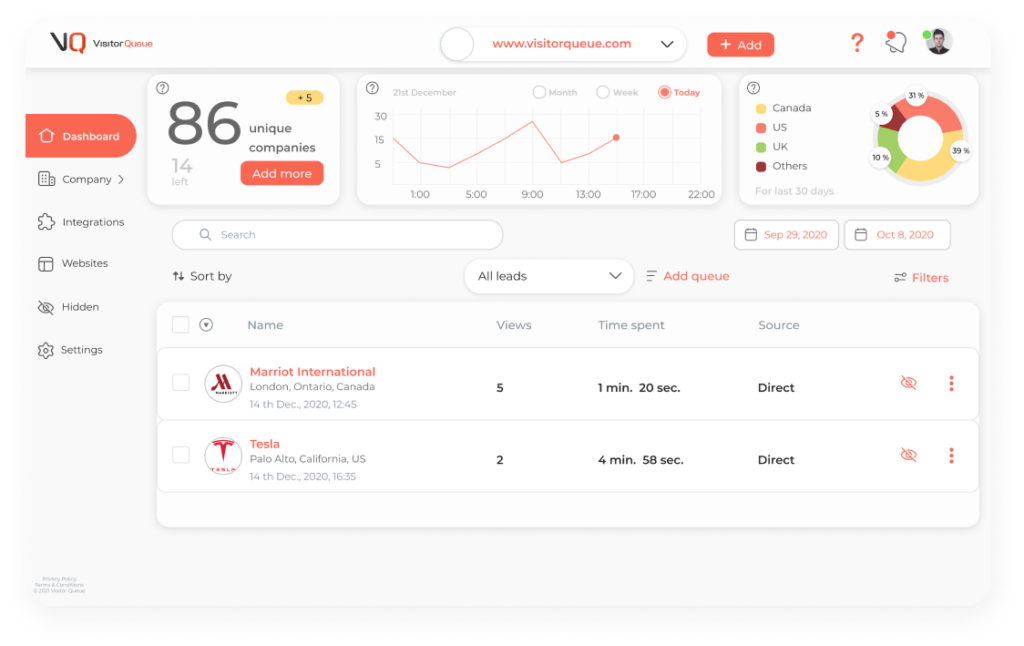
Gated Content
Gated content refers to a type of content that is locked behind a form. This could be eBooks, whitepapers, videos, checklists, and more. When a user enters in their contact information, they are then emailed their own copy of the content. When creating this content, you’ll need to ensure it is relevant to your business, and enticing enough to actually attract people to download it. After your lead downloads the content, you should add them to an email sequence to follow up with them and try to convert them into a paying customer. Since the lead willingly surrenders their contact information in exchange for the content, it follows privacy laws.
Chrome Extension
With the help of a Chrome Extension, like Snov, you can find emails from LinkedIn, Yelp, X, or even company websites. This can help you build email lists, that you can then add to your CRM to follow up with. With Snov, you can simply click on the extension, and email addresses will populate that are related to that website. This information is publicly available, ensuring it follows privacy laws.
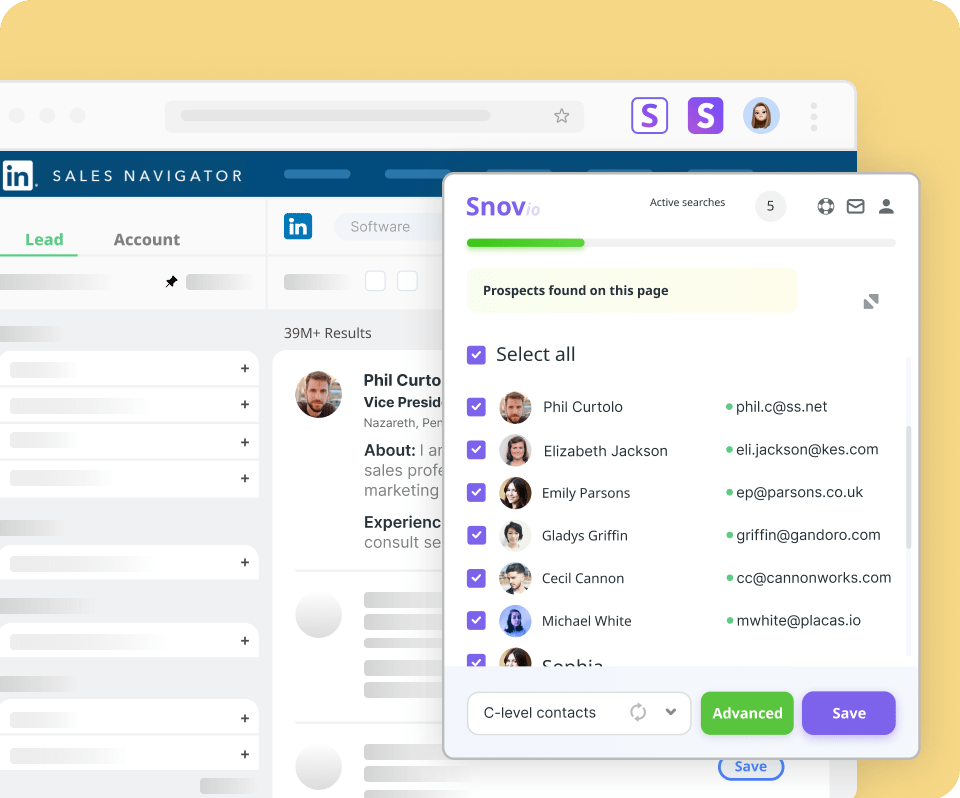
Live Chat
Assing a live chat to your website will not only help you provide better customer service, but it can also help you generate leads. When you implement a live chat, you can choose to require an email or other contact information before they can start chatting. If you require contact information, provide a disclaimer that this is how you can follow up in case you get disconnected. Similar to gated content, because your website visitor willingly surrenders contact information, they are fair game to contact as long as this is in your privacy policy.
Final Words
Ensuring that your company is compliant with privacy laws is essential. As technology and privacy are changing every day and getting more strict, it’s important that you stay on top of your local privacy laws and industry standards. Companies that prioritize compliance in lead generation have the opportunity to improve trust and respect from their customers. As always, if you have any questions about using Visitor Queue for lead generation, do not hesitate to contact us.
 Identify
Identify Personalize
Personalize Benchmark
Benchmark Agencies
Agencies Integrations
Integrations Case Studies
Case Studies Use Cases
Use Cases Blog
Blog Resources
Resources

